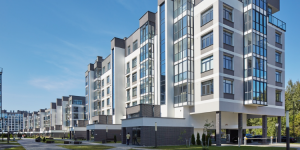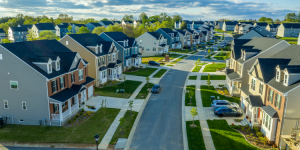
Adrian Leeds grew up in New Orleans but stayed in New York, Tennessee and California. With over 21 years of experience in marketing and public relations, she is also a French property expert. In this Interview, she shares her views about the French real estate market.
Hello Adrian, could you quickly introduce yourself and tell us how you came to live in France?
I moved to France in 1994 with a husband and a daughter for what we thought was a “one year” test...and never left. Three years later, I left the 20-year marriage with very little money and not even the right to work in France, but stayed with my daughter. It's been a roller-coaster ride every since!
What are your views about the current French real estate market, especially that of Paris?
The current real estate market in France is forever evolving with the variable conditions that affect it: the highs and lows of interest rates of financing, strength or weakness of the Euro, terrorist activity or lack of, unemployment and strength of economy and most important, the laws that govern real estate transactions and taxes. Paris real estate has not suffered a loss in prices since the low in 1998. Prices flattened out on a couple of key occasions, such as the economic crash in 2008, but never destabilized and is currently on a price and sales volume increase.
How, according to you, has the French real estate market evolved for expats in France? Has there been a rise or decrease in the demand?
Those who purchased in the early 2000's have benefitted most from their investments. For the next 10 years or more, foreign investors have been able to realize significant rental revenues and large increases in the value of their property. Since the “crack down” on short-term rentals in Paris beginning in 2009 (the only city to enforce the national regulations), getting a good “ROI” is exceedingly more challenging. Demand is still high, particularly in Paris and Nice, as the rate of exchange from dollar to euro is quite favorable and lending rates are at an all-time low. But demand is always strong among American expats and we find that given the current rental laws, investors are buying more expensive properties and are not dependent on rental revenues to maintain them.
What are the current trends of the French real estate market? How do you explain them?
Property values are on the rise as are sales volumes, not only in Paris, but across the country. This is primarily due to the current low interest rates and favorable rates of exchange.
Is it easy for an expat to find housing in the country, in general? What are the types of accommodation that are available?

It is near to impossible for anyone, much less expats, to find rental accommodations in France! Paris is suffering a serious housing shortage, so available property is scarce. One reason for that is due to the fact that the laws currently favor the tenants, therefore landlords are very cautious about to whom they rent, if they rent at all. In addition, rental of a secondary property less than one year is currently illegal (Paris only), therefore an expat wishing to reside in Paris more than one month and less than one year is out of luck!
Are expats more likely to rent or buy housing in France, in Paris especially?
Expats, like anyone, do both. There are non-residents who purchase for investment and for their future when they are ready to move here full-time – generally for their retirement years. There are expats who either can't afford or don't wish to own property in France and who rent.
What are the advantages and disadvantages of investing in real estate or buying property in France?
Purchasing in France as compared to other European countries is a safe investment bet. There are tight rules and regulations along with consumer protection in France that may be highly bureaucratic, but which make the investment fairly risk free. The cost of entry is high, but the cost of ownership is low, particularly compared to the U.S. where property taxes can be unimaginable. Capital gains taxes are high on secondary properties in France, but reduce over time, so long-term ownership is more desirable. Property prices tend to remain relatively stable thanks to a variety of aspects of the system which do not encourage “flipping,” “price wars” or other events that would create a “bubble” or make the market volatile. In cities like Paris, where building restrictions are rigid, the quantity of property is more finite and therefore demand usually out performs supply, keeping prices and values up.
What are the formalities expats can expect when buying property in France?
There is no difference between an expat and a native French person purchasing property in France. The process is highly bureaucratic and cumbersomel, however, an expat who is not familiar with the laws, the system and the language, can be overwhelmed by the bureaucracy of the process. We do not recommend they venture into the market without professional advice and assistance.

In general, who are the expats that are likely to buy property in France (any specific feature: nationality, profile, family...)?
Expats of all kinds purchase in France, and do so in particular communities. The British are the biggest foreign buyers overall, followed by Italians, particularly in Paris and on the Riviera. Americans tend to purchase in Paris, Provence and the Riviera.
As an expat, what should one expect in terms of rent prices?
Rental rates for long-term rentals in Paris are approximately 35€ per square meter per month for a furnished apartment. However, rent control was introduced in August of 2015 and rates are determined by district and apartment amenities. Most landlords are not complying with the rent control laws in an effort to maintain the value of their investments and various groups are lobbying against them. Short-term rentals are considerably higher – two to three times.
Expert have recently been predicting a rise in real estate prices in France by 2017. How far do you believe that is true?
Prices have been and are definitely on the rise for 2017. The statistics and trends reported by the Chambre de Notaires confirm this.
What would be, according to you, the ideal places to invest in property in France?
The two most ideal spots in France in which to invest are Paris and Nice. Paris, because Paris is Paris as an international and historic city with a finite geographical and highly regulated market. Nice because it's an international hub with enormous growth, with properties at half the price of Paris with excellent rental potential.
What would you advise to soon-to-be expats looking for housing in France?
I would advise never to seek property or go through the process in France alone without the counsel of professionals who are looking out for their interests.



















